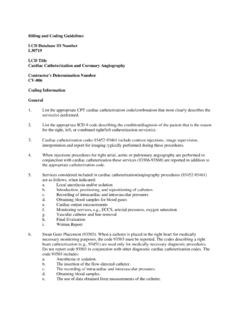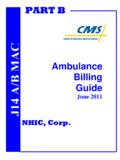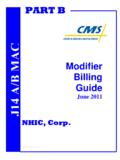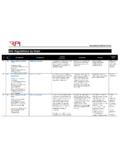Transcription of Guide For Third Party Reimbusement Of Facility Fees
1 Guide For Third Party Reimbusement Of Facility fees American Association for Accreditation of Ambulatory Surgery Facilities, Inc. Committee for Insurance and reimbursement John Pitman III, Chair American Association for Accreditation of Ambulatory Surgery Facilities, Inc. Guide FOR Third Party reimbursement OF. Facility fees . Committee for Insurance and reimbursement John Pitman III, Chair President Vice President Secretary Treasurer ALAN GOLD, LAWRENCE S. REED, HARLAN POLLOCK, HARLAN POLLOCK, (2006-2008) (2006-2008) (2006-2008) (2006-2008). JAMES A. YATES, ALAN GOLD, HARLAN POLLOCK, LAWRENCE S. REED, (2004-2006) (2004-2006) (2004-2006) (2004-2006). MICHAEL F. McGUIRE, JAMES A. YATE,S LAWRENCE S. REED, ALAN GOLD, (2002-2004) (2002-2004) (2002-2004) (2002-2004).
2 Table of Contents: Introduction to Insurance reimbursement for AAAASF Accredited Ambulatory Surgical Centers pp 3-4. Legal Matters pp 5-7. Managing Overhead Expenses pp 8-11. Billing Considerations pp 12-14. Acquiring Participation with Private Carriers pp 15-17. Attracting Other Providers and Carriers to the Facility pp 18. This article contains information about reimbursement matters for ASCs. Any legal information provided in this article is not legal advice. Legal advice must be tailored to the specific circumstances of each reader. In addition, although AAAASF and the author have made every effort to ensure that the information in this article is accurate, the healthcare regulatory landscape changes daily and may vary considerably by jurisdiction.
3 AAAASF and the author strongly recommend that investors in and users of ASCs seek individual legal counsel to review their ownership structure and billing practices for compliance. 2. Introduction to Insurance reimbursement for AAAASF. Accredited Ambulatory Surgical Centers The last quarter century has seen a dramatic shift in surgical practice across all specialties. With advances in anesthesia safety, a better understanding of the physiologic response to surgery, the use of prophylactic antibiotics, and less invasive surgical techniques surgeons are now able to safely perform the majority of cases in the outpatient setting. Third Party payors and the federal government are keenly aware that outcome studies continually demonstrate that outpatient surgery performed in an accredited ambulatory surgery center (ASC) leads to excellent outcomes at a cost significantly below that of hospital based facilities.
4 In fact it is federal CMS policy to encourage case shifting to ASC care whenever possible primarily because of the lower cost. As an owner or shareholder in an ASC the prudent surgeon can take advantage of this circumstance to provide the best possible surgical experience for the patient and do so in the most efficient and reasonably profitable manner. AAAASF accredited ASCs have taken many forms. In some cases they can be as simple as a single provider office based surgical suite. In other cases they can as complex as a large multi-specialty, multiple surgeon Facility . No matter what form is taken the performance of appropriate cases reimbursed by Third Party payers will have a significant number of salutatory effects. First and foremost, Third Party payors are always looking to control costs and are increasingly supportive of shifting care to an ASC.
5 As a general rule, they are very willing to reimburse the ASC Facility fees well beyond what they pay for surgeons fees alone. Increasingly surgeons are finding that cases that pay only a surgeon's fee are barely profitable. However, when a Facility fee is added these cases can return to significant profitability. In addition the practitioner is now empowered to tightly focus on control of both safety and cost. The use of the AAAASF guidelines enables the surgeon to attain a proactive stance towards safety issues and correct potential problems in a much more timely and direct fashion than the typical hospital committee structure. In addition, prudent ASC management virtually demands careful tracking of costs. Most surgeons have little knowledge of the cost factors in a typical case they perform.
6 By being directly involved in these issues surgeons find that they are able to be very helpful in cost control measures without compromising safety. The surgeon also will typically find much greater convenience and improved time management when utilizing their own ASC. By keeping cases in house the ASC will allow the utilization of assistants familiar with the surgeon's needs leading much greater efficiency in case time. Struggles with scheduling and long drives to multiple hospitals as well as emergency cases bumping cases on the elective schedule is virtually eliminated. These efficiencies can allow the surgeon to increase his/her caseload without a significant change in work hours. The use of a AAAASF accredited ASC is also empowering for the practitioner when it comes to negotiating with Third Party payers as both parties now share a mutual interest in cost control for the patients and the surgeon now has a means of providing lower cost 3.
7 Care for the payer. This allows even the solo practitioner to attract much more favorable Third Party payer contracts. Instead of having case reimbursement virtually dictated to the practitioner most Third Party payors are willing to discuss Facility reimbursement . Charitable care also can become less financially onerous. Many practitioners and patients find that a single price to cover pre and post-operative care, operating room and anesthesia fees (an arrangement familiar to cosmetic surgeons) can be worked out reasonably and equitably in advance. In point of fact, ASC licensure by some states requires a certain percentage of charitable care to be performed in the Facility . However, by providing a lower cost setting, patients lacking adequate coverage can find that their care becomes more affordable.
8 In addition, in the setting of a profitable ASC these cases can become less financially taxing for the operating surgeon. When taken together the surgeon owner/shareholder of an ASC will find that both gross and net income can rise substantially. This derives from several sources. Income can rise directly from Facility fees . More favorable contracts can improve revenues for the surgeon's office overall. Finally, downstream income can improve dramatically with the typical improvement in efficiency experienced by surgeons participating in ASC. ownership/use. This Guide is meant to serve as a very basic introduction to Facility fee reimbursement in AAAASF accredited ASCs. The opinions expressed in this Guide are not definitive and cannot substitute for sound legal and professional advice (please refer to disclaimer on page 2).
9 4. Legal Matters It cannot be stressed enough that when the provider embarks on the adventure of seeking reimbursement for an ASC there is a virtual minefield of rules and regulations unique to ambulatory surgery. This chapter cannot substitute for sound legal advice but is intended only as a very brief and general Guide to some of the governing principles. The ASC. owner/operator is strongly urged to seek sound and experienced legal advice proactively. It is easy to make very expensive mistakes or place oneself in significant legal and financial jeopardy if these issues are not carefully addressed well in advance of any attempt at collecting Facility fees . Attempting to fix damage retroactively can cost enormous amounts of time and money both in potentially lost revenues, legal defense and in possible cessation of ASC operations while these issues are being sorted out.
10 Also it is axiomatic that ignorance of the law is not a valid legal defense. The ASC operator/owner must be aware that a whole host of state and federal laws are always involved and each state is different in how it approaches ASC regulation. Some states require licensure of an ASC and some states require a Certificate of Need (CON). It is foolhardy for the physician owner/operator/shareholder to not get sound legal advice when setting up an ASC for reimbursement and familiarize him/herself with the applicable legal concepts. A. multitude of legal concepts apply to ASC reimbursement and operation and include (but are not limited to) contractual law, restraint of trade, conflict of interest, anti-kickback statutes, anti-self referral rules( Stark), state licensure, CON, reimbursement rules, contract language, dispute mediation, and governing law a concept where the state the ASC is operating is not the state which governs contract rules.





